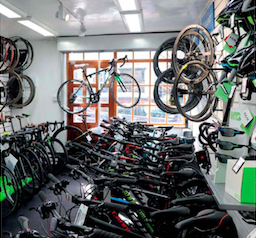The upsell. The ultimate art form in the world of retailing, and the recipient of untold numbers of seminars and “how to” guides, as each retailer clambers to convert a potential purchase into an alternative, pricier one, without running off the customer entirely. It’s a ubiquitous, tried-and-true retail strategy, and I wanted to know more about how today’s bike shops, in particular, approached upselling.
It’s not always apt for the retailer to push every transaction upwards; instead, it may prove more desirable to introduce customers to options which tick all of the right boxes whilst making financial sense. It’s a tricky balance, and more established cycling retailers will understand the necessity of flexibility and the fruits of building trust in the hopes of acquiring business, perhaps repeated.
Customers may not be aware of certain trade-offs at the outset – for example, some retailers may list a carbon bike at a similar price point to an aluminium counterpart, however the former will typically feature lower-end componentry, potentially negating the benefits of choosing the carbon frame. It’s essential that retailers of any kind are able to ascertain the “must- haves” of any customer’s ultimate choice, and push forward with the rewards of the “nice-to-haves”.
This is where physical bike shops really shine, benefitting from the customer’s pre-conceived, and largely correct, notion that spending more money on a premium bike, or individual higher-end component, will result in an appreciable difference in performance. Compared with other forms of retail, this notion is arguably one that establishes itself
more naturally in the environment of the cycling shop, with noticeable shifts in product quality sometimes being self-evident, or easily demonstrated to a customer. The leap from a set of stock wheels to a higher-end, specialist pair, is night and day in terms of the all- important metrics – comfort, speed and durability – perhaps enabling cycling retailers to be relatively bullish when it comes to upselling.
Even with this advantage, quantifying an increase in quality may still stand as a cause of hesitancy for many customers and a guided tour of the store’s shelves may not be enough in and of itself to secure an upsell. This is where education, and not traditional salesmanship, plays a leading role, enabling customers to feel as though their choices are well- founded and have been reached autonomously. With this in mind, many bike shops have taken to performance data as a key upselling tool – after all, what could be more persuasive than an objective comparison between bikes, based on the individual customer’s time in the saddle?
The staff at Westbrook Cycles – a leading online cycling retailer with a popular Stokesley- based store – are strong proponents of this method, and have successfully integrated modern bike-fitting into their sales process. The Guru Bike Fit is a world-class bike-fitting facility which, when operated in a retail environment, offers customers the chance to find their perfect bike through comprehensive performance analysis in tandem with the freedom to adjust and trial a long list of components and riding styles.
It’s an effective organic upseller, presenting customers with immediate feedback, which correlates directly to the components they themselves have chosen, perhaps on the recommendation of a store employee. This could potentially lead to the purchase of a higher- end bike as a result of the customer appreciating the return on investment.
But just how much emphasis has Westbrook Cycles placed on the Guru as an upselling tool? I reached out to them for their thoughts on the benefits the system provides to their customers: “The Guru gives customers confidence to know what they’re buying will fit them,” said one representative.
This confidence, realised organically, is then perhaps the single most important factor for customers deciding whether or not to “stick” or “twist” with regards to their final selection.
With bike-fitting systems becoming more and more commonplace in local bike shops, it appears to be that the value of this type of technology is well understood as a means to encourage customers to experiment with products from various price- brackets and is set to maintain as a prominent contributor to the upsell for the considerable future.
 BikeBiz Bicycle and cycling retail news
BikeBiz Bicycle and cycling retail news




